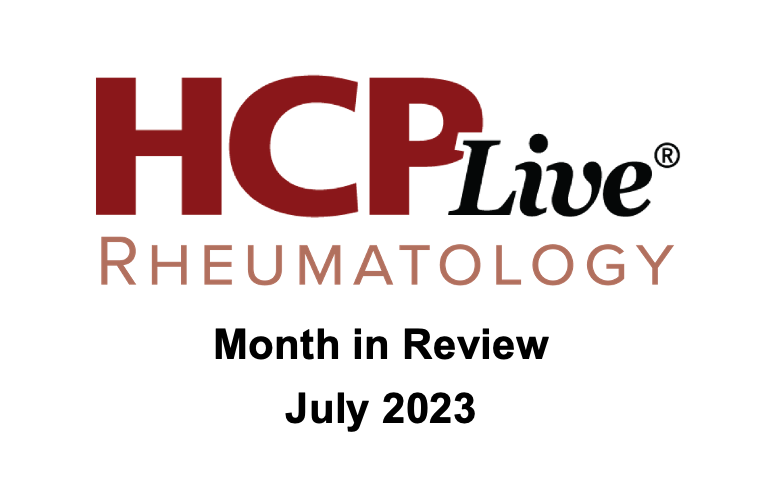Rheumatology Month in Review: July 2023
The rheumatology month in review features studies exploring ways to enhance care in patients with rheumatic disease, a study reporting an increased risk of adverse COVID-19 outcomes for patients treated with Janus kinase (JAK) inhibitors, and the latest data on pegloticase plus methotrexate co-therapy for treating and managing gout.

Implementing Strategies to Enhance Care
Telemedicine was catapulted into mainstream care near the beginning of the COVID-19 pandemic. As public health measures including lockdowns relegated individuals to home and temporarily limited in-person care services, many providers began to offer remote visits for patients when a face-to-face consultation was unfeasible.
Additionally, the “It Will” campaign was designed to empower and inform patients with lupus, as well as their caregivers, to prevent lupus-related organ damage.
Revolutionizing Rheumatology: Exploring the Impact of Telemedicine in Transforming Care
The benefits of telehealth are clear, such as reducing travel time and increasing flexibility and access to care. Rheumatic disease, particularly pediatric patients, has served as a proving ground for this technology as these patients often reside in areas where the availability of rheumatologists is severely limited.
But telemedicine is not without its challenges. Experts cite unfamiliarity with technology and access to internet as drawbacks to remote care, particularly for older patients and those who are less tech-savvy. Others detail limitations in managing patients with uncontrolled symptoms and severe disease activity.
As the field moves into a post-pandemic world, the future of telemedicine hangs in the balance.
“It Will” Campaign Helps Patients With Lupus Prevent Organ Damage
In an interview with HCPLive Rheumatology, Bijal Galloway, MBA, explains the “It Will” campaign, which was inspired by the findings of a global survey conducted with healthcare providers. Results revealed a lack of discussion about organ damage risks, delayed addressing of potential organ damage, and low patient awareness of their personal risk.
“One crucial takeaway from our survey is the existence of a significant need and gap in education and awareness surrounding lupus and its potential consequences, particularly organ damage,” Bijal explained. “As leaders in the lupus space, we are committed to addressing this need and taking action to improve the lives of lupus patients. The ‘It Will’ campaign is one of our initiatives to bridge that gap and empower patients to take charge of their health.”
Adverse Outcomes in Rheumatic Disease
As rheumatic diseases often coexist with other health issues, including neurologic disorders, depression, and anxiety, patients often experience increased mortality. Previous research has also linked widespread pain, commonly associated with fibromyalgia, with increased mortality rates for all-cause mortality.
Fibromyalgia Diagnosis Linked to All-Cause Mortality
According to research published in Rheumatic and Musculoskeletal Diseases, patients with fibromyalgia should be screened for suicidal ideation, the prevention and treatment of infections, and accident prevention.
“Studies have shown that medical staff are reluctant to accept fibromyalgia as a medical condition, and they face emotional and psychological difficulties interacting with these patients and coping with their disorder,” investigators concluded. “Fibromyalgia is often called an ‘imaginary condition’, with ongoing debates on the legitimacy and clinical usefulness of this diagnosis. Our review provides further proof that fibromyalgia patients should be taken seriously, with particular focus on screening for suicidal ideation, prevention of accidents, and prevention and treatment of infections.”
JAK Treatment Increases Risk for Adverse COVID-19 Outcomes
Patients with rheumatoid arthritis treated with JAK inhibitors are at a significant risk for hospitalization, composite adverse outcomes, and mortality. This risk was particularly high among patients who did not receive the COVID-19 vaccination.
These risks were not observed in patients receiving interleukin-6 (IL-6) compared with tumor necrosis factor inhibitors (TNF), including adverse outcomes and mortality.
Pegloticase Plus Methotrexate Co-therapy
As pegloticase is generally the last treatment option for this patient population, achieving sustained lowered urate levels is critical.
Findings from the phase 4, randomized, double-blind, parallel-group, placebo-controlled, multicenter MIRROR trial demonstrated pegloticase injection plus methotrexate was an effective and sustainable long-term treatment strategy for patients with uncontrolled gout.
In a supplementary interview, Kenneth Saag, MD, lead investigator of the trial and director of clinical immunology and rheumatology at the University of Alabama at Birmingham, discussed the clinical significance of these results.
Study Demonstrates Increased Benefits of Pegloticase and Methotrexate Cotherapy for Uncontrolled Gout
The study was an extension of the original research, aimed at investigating the long-term effects of this combined therapy to further understand its benefits and potential impact on patient care. Ultimately, 152 patients were randomized 2:1 to receive pegloticase (8 mg infusion every 2 weeks) with blinded methotrexate (oral 15 mg/week) or placebo for 52 weeks.
At month 12, response rate was significantly higher in patients treated with concomitant methotrexate when compared with placebo. The co-therapy cohort also reported fewer discontinuations and complete resolution of ≥1 tophi occurred in 53.8% of the methotrexate group compared with 31.0% of those receiving placebo.
Kenneth Saag, MD: Pegloticase and Methotrexate Concomitant Therapy Demonstrates Continued Benefits for Gout Treatment
“The team's motivation to assess the long-term outcomes of pegloticase in combination with methotrexate stems from the drug's significant efficacy in treating advanced gout, particularly in patients who have not responded well to other treatments,” Saag stated. “Severe gout can lead to the formation of uric acid deposits known as tophi around the joints, causing disability and potential complications like ulcers and infections. For patients with severe gout, conventional treatments are often slow in removing these tophi, making pegloticase a game-changer due to its effectiveness in resolving the condition.”
Saag emphasized it is crucial for patients to take the condition seriously, seek appropriate medical care, and be aware of the right treatment and lifestyle adjustments. With these factors in mind, gout can be effectively managed and even reversed, leading to improved health outcomes.